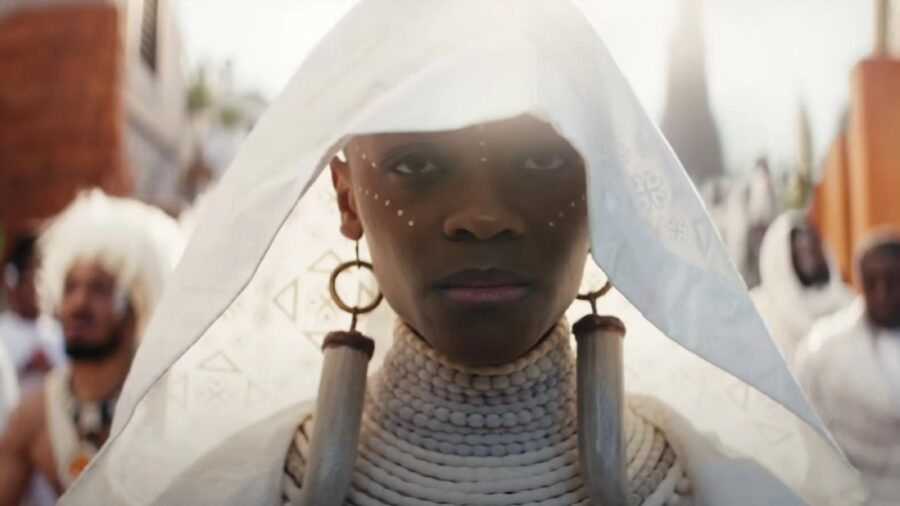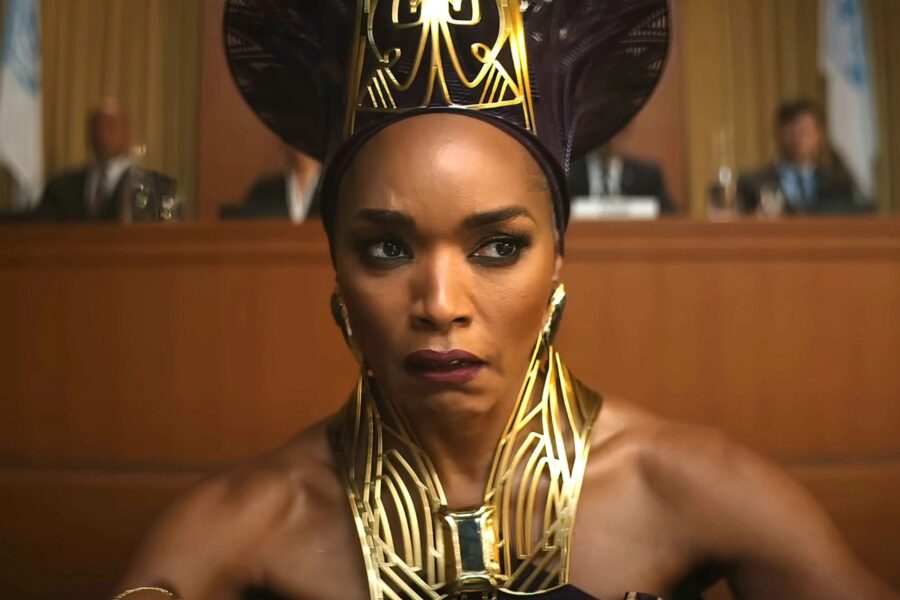Black Panther: Wakanda Forever Review: Epic, Heartbreaking, And Maybe Marvel’s Best
Black Panther: Wakanda Forever is finally here, and our reviewer says it just might be the best thing Marvel Studios has ever made.
Black Panther: Wakanda Forever is without a doubt the best film Marvel Studios has released this year, and I don’t feel an ounce of caution in calling it the most effecting and introspective MCU film to date. At the same time, the long-awaited sequel gives us the grand scope of the narrative’s best epics, incredible action sequences, and gorgeous visuals. Ryan Coogler and his incredible cast and crew set out to create a worthy tribute to the late Chadwick Boseman, and you will leave the theater knowing they succeeded and then some.
BLACK PANTHER: WAKANDA FOREVER REVIEW SCORE:

The film opens with the death of T’Challa from a mysterious illness which, much like Boseman, we are told he “suffered in silence.” Shuri (Letitia Wright) races to discover a way to synthetically create the heart-shaped herb–the same one that gives every Black Panther their powers and which Shuri believes will cure him–because Killmonger (Michael B. Jordan) destroyed the remaining supply in the previous film. Shuri fails and news of T’Challa’s death arrives, setting the mournful tone that never leaves Black Panther: Wakanda Forever for very long.

The struggle of Shuri to deal with her brother’s loss–and with the trauma that’s still waiting for her in Wakanda’s war with Namor (Tenoch Huerta)–is central to the story. That isn’t much of a shocker, of course, but what is surprising is how deeply Black Panther: Wakanda Forever digs into the existential crisis Shuri suffers. A woman of science, Shuri refuses the words of family and allies like her mother (Angela Bassett), Nakia (Lupita Nyong’o), and M’Baku (Winston Duke) that T’Challa is “with his ancestors.”
In spite of how dearly the spiritual beliefs of Wakanda are to its people, Shuri can find no peace with them–nor take comfort from them–and insists that T’Challa is simply gone: not present “in spirit” but simply annihilated in every way. It is a familiar internal struggle for many who have suffered such a loss, and a surprising place for a Marvel superhero movie to go. It is a big part of what elevates Black Panther: Wakanda Forever above everything else in the narrative.
It’s also one of many ways in which we find echoes of T’Challa in Shuri in Black Panther: Wakanda Forever. In one Boseman’s very first Marvel scenes–in 2016’s Captain America: Civil War–his character is feeling vengeful after the violent death of his father. He tells Black Widow (Scarlett Johansson) that his father, like many in Wakanda, believed that “death is not the end,” but that “I am not my father.”
The introduction of Namor and the people of Talokan is masterful, and the first scene in which they appear is perhaps one of the scariest we’ve ever seen in the MCU (while achieving it without endless shots of candles blowing out and eyeball zooms: take notes Sam Raimi). Huerta is a perfect choice for Namor, embodying the qualities of the underrated and complex character of the source material–noble, vengeful, and eternally devoted to protect his people.
One of the best things about the sequel is how much the returning cast from Black Panther gets to shine, along with newcomers Namor and Riri Williams (Dominique Thorne)–the latter of whom will return for Disney+’s Ironheart as TVLine and others reported in 2020. Okoye (Danai Gurira), Ramonda, M’Baku, Nakia, and even Martin Freeman’s Everett Ross expose more depth than time allowed for in the original 2018 film.

Among the standout performances is Bassett as Queen Ramonda, who we get to see as a protective and tender mother, and perhaps the fiercest monarch to appear in Black Panther: Wakanda Forever or any other Marvel project. If there is any weakness to her performance, it’s that after watching her confront the United Nations over the question of sharing vibranium, you’ll wonder why the hell she hasn’t been the one in charge all along.
A scene in the Wakandan throne room with Ramonda lashing out at Okoye proves to be the most difficult moment to watch in all of the MCU. It is raw and honest and will smash your heart to pieces. If Bassett doesn’t get an Academy Awards nomination for her performance here, she should be the one slapping somebody at the next Oscars.
I’m not going to tell you who the new titular hero of Black Panther: Wakanda Forever is, but I will say that the way Ryan Coogler handles the mystery is absolutely masterful. While Shuri has been the frontrunner for years; the events of the film make Okoye, Nakia, and even Queen Ramonda viable candidates until the moment one of them finally takes the plunge.
For Marvel fans looking for the trademark Easter eggs and surprising cameos–they’re there, though in terms of cameos maybe not as many as have been predicted.
The only thing about Black Panther: Wakanda Forever that disappointed me was the mid-credits scene. I won’t spoil it for you, but basically a fairly huge secret is unveiled and I felt like it was asking a lot from the audience–particularly at the end of an already emotional film–to cram such an emotional and exposition-heavy revelation in a mid-credits quickie.
Otherwise, Black Panther: Wakanda Forever is the new #1 on my list of Marvel films.












